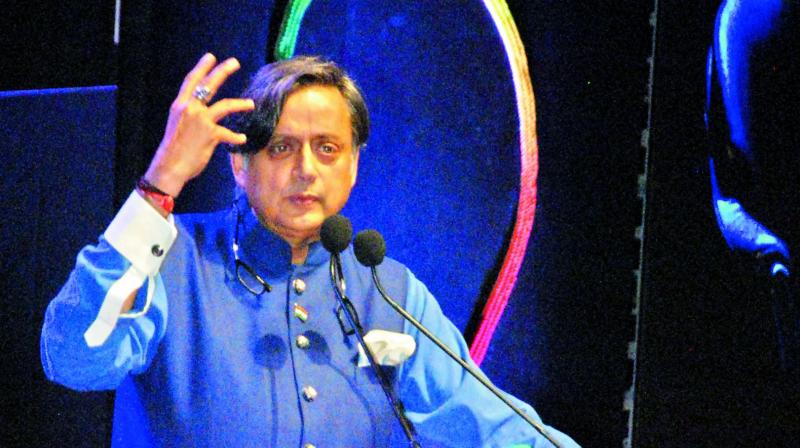Hinduism: A religion for the 21st Century
Tharoor says it is the only religion that grants complete faith to believers.

Hyderabad: A Manthan Samvaad is nothing if not illuminating, informative and introspective. The arrival of MP Shashi Tharoor was heralded by an abundance of applause. He has an impromptu style and enviable command of the language, but initially Mr Tharoor disappointed the audience by reading from his book Why I am a Hindu rather than speaking about it. That said, what he delivered was nothing short of a classic oration.
Mr Tharoor outlined his understanding of Hinduism based on his childhood experiences. He talked of his father who, after his bath every day, wrapped in a towel and with wet hair, stood in front of the family deity and chanted his mantras.
Not an unusual sight in many households, you might say, but Mr Tharoor drew attention to the fact that his father never asked his son to join in, or even say the same prayers, or repeat the rituals. This shows, Mr Tharoor said, that Hinduism is purely a personal matter between you and whatever image of your maker you choose to worship. In the typical Hindu way, Mr Tharoor was to find his own truth. When he was a teenager, he said he was an atheist when he discovered rationality, but turned religious when he discovered the limitations of rationality.
Mr Tharoor claimed other reasons why he was a Hindu. Tongue-in-cheek, he said faith does not require reason but proceeded to tell us why he is proud to be a Hindu. One of them is cultural and historical; to Mr Tharoor Hinduism is an expression of the ancient genius. He found reaffirmation for this in the writings of the Harvard professor Diana Eck, who wrote the Sacred Geography of India. Similarly, he also acknowledged that he was influenced by S. Radhakrishnan’s opinion of Hinduism as a collective of a people with a common history, common literature, and a common civilisation. In saying he was a Hindu, Mr Tharoor said, he is laying claim to this geography and history, claiming to be an heir to a tradition that stretches back to time immemorial.
Simultaneously, he is accepting of the idea of those who don’t feel comfortable with his idea of Hinduism and is also conscious of those who are Hindu but not Indian. There is a specific intellectual fabric which allows him his liberal attitude to life. Of particular appeal for Mr Tharoor is the idea that Hinduism cannot be confined to one sacred book. He especially likes the idea that he can find expression in the vast amount of freedom offered: in terms of worship or not; in terms of observing ritual, or not; in performing prayers, or not; in observing specific fasts for worship, or not.
Continuing with this theme, Mr Tharoor said Hinduism does not have restrictive dogmas, and refuses to shackle itself to one volume of holy revelation. It holds in itself several beliefs that may be mutually incompatible: wonder at the omniscience of the creator, and at the same time, scepticism of his ability.
In comparison, he said that a Catholic believes in the immaculate conception, offers confession, and is guided by the Pope and the priesthood. A Muslim must believe that there is no god but Allah and that Mohammed is his prophet. A Jew is devoted to his Torah, the Pentateuch and the Talmud. While a Parsee has a fire temple, and the Sikh honours the Guru Granth Sahib over all else, there is no Hindu equivalent for any of these statements. There are simply no binding requirements to being a Hindu, not even a belief in God.
Who influenced Tharoor? He claimed inspiration from Swami Vivekananda and Mahatma Gandhi. Having completed his say about Hinduism, Mr Tharoor moved to Hindutva. He called it restrictive and reactive, and feels it is a betrayal of the basic beliefs of Hinduism. He noted that in a recent speech the RSS chief Mohan Bhagawat seemed to have toned down the critical aspects of Hindutva, and affirmed a commitment to the Constitution. Then came Mr Tharoor’s grand statement: He said that Hinduism is the religion for the 21st Century and for the world.
Why? In answer, he pointed out that it is the only religion that grants complete faith to its believers to find their own answers, to the question of life, the nature and form of a God. In Hinduism’s Nirguna Brahman, there is similarity to the idea of god in Islam. When the idea did not catch on, the sages claimed that every way of imagining god is acceptable. It is a brilliant innovation of religion that allows you to worship god in any form.
“This means you can worship god as a pot-bellied human with an elephant trunk; you could also worship god as an eight-armed woman riding a tiger.” Extending this logic, he said it would also include the worship of a bleeding man suffering on a cross. In his view, Hinduism is a religion that places great emphasis on the capacity of one’s mind and values its capacity for reflection, enquiry and self-study.
